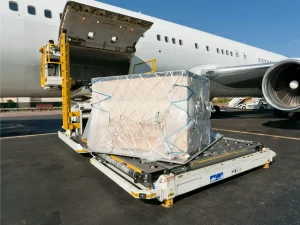Why are lithium batteries not allowed on planes? This is a common question asked by frequent travelers. Undoubtedly, batteries have become an integral part of our daily lives. Their usage of our products includes smartphones, laptops, and even e-cigarettes. However, when it comes to taking on a plane, things are not as simple as they seem.
While they are a great source of power, they can be dangerous if they overheat or get damaged. If they get overheated, they can catch fire and even explode. This phenomenon can create a serious safety risk on airplanes. In this article, we will discuss everything about whether you can take lithium-ion batteries on a plane or not. If not, why? So, let’s begin!
Are Lithium Batteries Allowed on Planes?
The answer is both, yes and no! Confused? Worry not, as I explain whether batteries are allowed on planes or not.

Smaller rechargeable lithium batteries used inside the devices are allowed. It means you can carry your smartphone, laptop, and other devices inside the airplane. Those smaller lithium batteries pose no safety concern for passengers or planes. However, the larger-sized batteries are generally not allowed.
Batteries with a capacity of under 100 Wh are allowed on the airplane. Generally, our smartphones, laptops, and other devices use batteries having an energy capacity lower than 100 Wh. Suppose you have a smaller battery, but it is not inside the device. In such a case, you’ll have to carry this battery in your carry-on (transparent bag).
Some airlines allow batteries of 100–160 Wh size. These battery sizes are commonly used in cameras and drones. However, large batteries are not allowed. You cannot carry both in both checked-in and carry-on luggage. Simply put, you can carry cameras, smartphones, drones, and laptops as they have smaller batteries.
The reason is that large batteries are more difficult to handle. Moreover, they can leak, resulting in a fire inside the airplane. If not addressed, the leakage could make the storage compartment messy and unclean. Although lithium-ion batteries are safer, airline authorities are cautious about the risks. As a passenger, you should also avoid carrying the batteries when traveling.
Why are Lithium Batteries Not Allowed on Airplanes?
Lithium vs. alkaline Batteries are often compared in terms of safety risks on airplanes. Lithium batteries are a powerful and efficient source of power, but they are not allowed on airplanes. In this section, we will analyze why lithium batteries are prohibited on aircraft and the risks they pose.
1- Risk of Fire
One of the main reasons lithium batteries aren’t allowed on airplanes is the risk of fire. Lithium-ion batteries can overheat and even catch fire. They may even explode if damaged or short-circuited. The problem happens because the battery’s internal components are sensitive. They are vulnerable to temperature fluctuations or pressure. It is very easy to start a fire in a confined space.

2- Thermal Runaway
Thermal runaway is a serious issue that renders lithium batteries hazardous on airplanes. This issue occurs when a battery’s temperature rises rapidly to dangerous levels, often resulting in a fire or explosion. Sometimes, it’s challenging to prevent this reaction from occurring. The heat can even melt the battery casing, releasing toxic gases and starting a fire.
3- Risk of Malfunction
Unlike regular fuel, lithium batteries can malfunction without warning. The battery’s internal parts can react badly to certain conditions, causing short circuits or leaks. Also, the technology used to detect faulty batteries isn’t always reliable. Because of this, it’s hard for flight attendants or airport security to manage these risks before or during a flight.
4- High Energy Density
Lithium batteries store a large amount of energy in a small space. While this makes them great for portable electronics, it also means that if something goes wrong, the consequences can be much worse. A malfunctioning lithium battery can release a tremendous amount of energy all at once, leading to an explosion or fire.
5- Risk to Cargo Hold
If a lithium battery catches fire in the cargo hold, it can be much more challenging to manage due to the limited access. The cargo hold is isolated from the cabin, and fires there might go unnoticed until it’s too late. This could endanger the entire flight. Additionally, the limited firefighting resources in the cargo hold make it difficult to contain a fire once it starts.

6- Chemical Hazards from Battery Leaks
In addition to fire risks, leaking lithium batteries can pose a danger to health and safety. When these batteries leak, they release harmful chemicals like flammable electrolytes. If these chemicals come into contact with the skin or are inhaled, they can cause severe burns or damage to the eyes. Because of this, it’s crucial to prevent leaks.
7- Regulatory Measures and Airline Policies
Groups like the International Air Transport Association (IATA) set rules to limit transportation. Custom lithium-ion battery manufacturers should adhere to safety standards established by regulatory bodies. Passengers must pack lithium batteries in a particular way to minimize risks. There are also limits on the power of the batteries (measured in watt-hours).
What Batteries Are Not Allowed on Airplanes?
When traveling by air, it’s essential to understand which types of batteries are prohibited and why. Let’s have a detailed look.
1- Lithium-ion Batteries (Over 100 Wh)
Lithium-ion batteries power devices like laptops, smartphones, and tablets. You can take smaller batteries in your carry-on. But larger ones have restrictions on them. Batteries exceeding 100 Wh are typically not allowed in checked baggage. Passengers may need special permission to carry them. These bigger batteries are more likely to overheat and catch fire if they malfunction.
2- Lithium Metal Batteries
These batteries are used in devices like cameras, hearing aids, and wristwatches. Unlike lithium-ion batteries, they are not rechargeable. They contain metallic lithium, which is highly reactive. It can catch fire if exposed to air or moisture. Due to this risk, lithium metal batteries are typically not allowed in checked luggage.
3- Damaged or Leaking Batteries
Airlines do not allow damaged or leaking batteries on airplanes. These batteries are more likely to overheat and malfunction. Leaking batteries release harmful chemicals, which can harm passengers and the aircraft. If you have a damaged or leaking battery, dispose of it properly and do not bring it on a flight.
4- Non-Rechargeable Batteries
Non-rechargeable batteries, like alkaline batteries, are generally safe for air travel. However, larger batteries, especially those used in high-power devices, can be dangerous. For example, airlines do not allow large batteries in power tools or heavy-duty equipment in checked luggage. If you need to bring them, follow the airline’s packing guidelines.
5- Nickel-Cadmium Batteries
Although less common today, some older devices still use Ni-Cd batteries. These batteries contain cadmium, a toxic metal. Ni-Cd batteries can leak harmful substances, especially when damaged, posing a safety risk. For this reason, airlines typically restrict Ni-Cd batteries on airplanes. Passengers should check their devices before traveling to ensure that they do not contain these batteries.
How Do You Travel With Lithium Batteries?
If you need to travel with lithium batteries, there are specific guidelines and precautions that you must follow.
- Transport lithium batteries in your carry-on luggage. This makes it easier for flight attendants to manage any fire or malfunction.
- You should understand how to store lithium-ion batteries properly before your flight.
- Airlines prohibit lithium batteries in checked luggage, especially those with higher capacities.
- Always know the watt-hour rating of your battery, as airlines may ask for this information during security screening.
- Inspect your batteries before traveling. Do not bring damaged or leaking batteries on board.
- Dispose of damaged batteries safely in the designated disposal bins located in airports.
Frequently Asked Questions
What happens if you bring a lithium battery on a plane?
Larger lithium batteries cannot be carried. If these batteries leak, it can cause a fire inside the plane. Additionally, leakage of electrolyte from these batteries can make the storage component messy.
Can I take lithium batteries on a plane?
Yes, you can take lithium batteries on a plane if they are smaller in size. However, most airlines don’t allow the larger batteries due to the safety issues. Among those, the risk of fire is the most fatal.
How many spare lithium batteries can I bring on a flight?
You can take multiple spare lithium batteries if their size is lower than 100 Wh. Additionally, you’ll have to keep them in carry-on luggage. You might also be asked to keep the batteries in a transparent bag for better handling.
Are lithium batteries banned on all airlines?
No! Lithium batteries are not banned. You can take small-sized lithium batteries on an airplane. However, the larger-sized batteries are prohibited and not allowed on planes. You cannot even carry them in checked-in luggage.
Conclusion
Batteries are excellent inventions. They store energy and meet demand in times of need. Right? However, these batteries can pose safety risks. For example, they consist of an electrolyte and an acid. These acid leaks can occur, posing a serious risk of fire.
Therefore, larger lithium batteries are not allowed on airplanes. However, the smaller batteries (less than 100 Wh) are generally considered safe. They can be taken on an aircraft, either used inside the device or in carry-on luggage. In this article, I’ve also discussed some potential causes of why lithium batteries are not allowed on planes.
